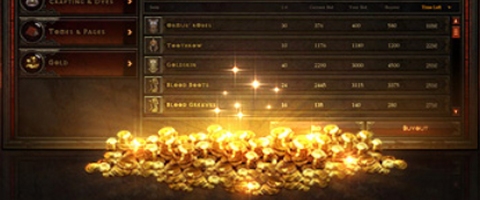Report: How Blizzard's Fixed Drop Rates Affect The RMAH

A lot of longtime fans are in denial that Blizzard's main focus and motivation behind Diablo III has been the Real-Money Auction House. Unfortunately, it's a sad truth proven by the very existence of two factors: the always-on and the Real-Money Auction House.
One of the things that has come under fire lately is that Blizzard has fixed loot drops to maintain a balance of the virtual economy (which is fuelled by a lot of real money), thus helping them net a sizable profit from high grade items on the Real-Money Auction House thanks to their 15% tax rate for real-money cash-outs.
Many defenders of Blizzard have stated that fixed loot drops is a "conspiracy theory" and pointed to lead designer Wyatt Cheng in the Reddit AMA who stated that the auction house does not determine what loot drops, saying...
The auction house has absolutely no effect on drop rates. There are conspiracy theories and misunderstandings, but I do want to re-iterate: there is NO interaction whatsoever. Bashiok mentioned earlier that we took the AH into account, so let me expand a little bit on that.The drop rates were tuned for a player who would never use the Auction House. For the majority of internal development, we didn't have an Auction House, and we all played using our own drops only. I've personally leveled multiple characters from 1 to 60 internally before the game came out using only drops that I found -- we all did.
Cheng's comments are a blatant lie, and while a lot of people claim that this voids Blizzard of fixing loot drops, it actually confirms it. You see, there is no single-player offline mode, so what is Cheng talking about fixing rates for players who never use the Auction House?
Think realistically about what he is saying..."drop rates were tuned for a player who would never use the Auction House". At what point in the game can loot drop that can't be used in the auction house? Is there a separate offline mode? Is there a way to play the game where loot can't be transferred to the auction house? Of course not. The game isn't designed where any player's loot is isolated from the rest of the game, so it's not true that the game drops loot based on someone who would never use the auction house because both the game and the auction house are tied together due to the always-on.
In this regard, the only way for Cheng's comments to be true would be if you could prove how the auction house does not play a factor into what loot drops. But that's not possible considering that all loot that drops can be added to the auction house. In turn, this means that anything that drops can play a role in the overall market value of the item as well as its selling price on the auction house based on its volume, and its volume is based on the fixed rate at which it drops, and the rate at which an item drops is determined by Blizzard.
Again, since no item can drop outside of the game's always-on atmosphere and the auction house cannot be disabled for any single player's game, it means all items affect the market value of Diablo III's auction house whether a player adds it to the auction house or not, simply because an item can never not be added to the auction house.
Your Daily Blend of Entertainment News
Bashiok's "clarified" statements, which appeared several days after his original admission to the loot drop fixing, also tries to paint the picture as if Blizzard is only monitoring drop rates but don't necessarily have them affixed to maintaining balance of the auction house, saying...
The AH doesn't have any affect on the literal drop rates of items depending on what's available.What I said, and what is true, is that with far more players and an increased proliferation of item trade, we have to factor in how many items are being found by players and how quickly a player can gear up by 'sourcing' items from others through trade and the convenience of the gold auction house.It has nothing to do with the auction house per se, but the general ease at which players have access to more items than they would without it and us needing to keep that in mind while balancing drops. It would be rather poorly thought out if we balanced drops completely ignoring all of the ways players can gear up, and trading is certainly one of them.Obviously everyone wants the best gear possible as quickly as possible, and us attempting to mediate that through design that takes all factors into account is not always going to be a popular notion.
Here, Bashiok's clarification is still an admission to loot fixing based on market stabilization. He's generally saying that loot will fluctuate to appease both auction house users and non-auction house users, as was addressed in the latest hotfix on June 29th.
Now let's get one thing clear: No one is saying all drops are specifically tied to what's in the auction house, instead all drops are affected by what can appear in the auction house based on Blizzard's preemptive fix of the loot's volume. For instance, players on the Asia server circumvented the fixed loot drops by item duping and then flooding the auction house with duped items. Blizzard had the server suspended for the entire weekend to clean-up the item duping because it crashed the virtual market on the Asia server.
Hence, Blizzard keeps a tight reign on drops so that the market never floods, never over-inflates and never over-saturates. But really think about it, why is that? What would it really matter in a video game if the market prices are driven horribly low for ultra-rare gear in a video game? What would it matter if someone pays $1 of real money for a legendary? It's just a game right? Couldn't Blizzard just let the cycle of the economy rising and falling play out like every other game? Apparently not.
Blizzard's 15% cut would be undermined if ultra rare loot sold low for any period of time. To address this issue beforehand, loot is fixed so that ultra high quality items are more-so "issued" out rather than simply random drops from tough enemy encounters.
In other MMOs market crashes happen all the time, but service providers address this issue by having all high-quality items either Bind on Pickup (which means a player cannot trade or sell the item once it's picked up) or Bind on Equip (which means that if it's useful only one person can equip it, ensuring that it only trades hands once to prevent market saturation.) This method keeps high quality items from flooding auction houses and instead keeps players grinding for their own version of the same or similar loot.
Of course, Diablo III could never employ Bind on Pickup or Bind on Equip because it would nullify too many high quality items from being eligible for appearing on the auction house. Again, Blizzard would lose a lot of money that way, even though technically, strictly in regards to the game itself, it wouldn't actually matter. It's much more profitable to keep items available for multiple trades because per every trade Blizzard takes a cut, effectively becoming a middle man to all previous trades that used to happen on the grey and black markets.
Again, you could say it's a "conspiracy theory" but then I point you to the item duping fiasco where the auction house was cleaned out and the North American and European servers were hotfixed before players could make proper use of the dupe. Blizzard never bothered waiting it out for the duped items to just get trashed and the market to balance itself out (even if they hotfixed it they could have waited for the market to balance itself out, which would have happened eventually if no one bought the duped items). Again, if it was just about the game, then loot would not be affixed to the persistent playing habits of every player who plays the game and would instead be tuned to the individual player experience.
Bashiok's original comment best summed up this situation before Cheng went on damage control and Bashiok posted a PR-friendly "clarification" a few days later, saying...
"The auction house obviously provides an incredible service to allow for very easy trades between characters, and essentially blows out the wide range of items you could have available to you at any one time. So, in fact, the AH has to be a factor in how we drop items. On one hand you have a huge benefit because you can buy and sell items very easily, as opposed to having to post up WTS threads in the old USEast trading forums, but on the other end it does impact the item pool economy with the inherent ease at which you can trade items. If the AH existed but wasn't a factor at all into how items dropped/rolled, the economy would be completely tanked within a matter of weeks."
That is the honest truth of the matter right there and is the exact model in which the auction house currently operates, as well as fits into everything mentioned above. Bashiok may have commented out of turn from what the higher-ups wanted but it was the truth...a truth that they later tried to spin as being a misquote and used "out of context". In reality, Bashiok was just being honest.
But Bashiok is 100% correct when he says "If the AH existed but wasn't a factor at all into how items dropped/rolled, the economy would be completely tanked within a matter of weeks.", and this doubles back to what I was saying before, as to why it would even matter if it's just a game? Well, it matters if Blizzard wants to make the most out of the 15% otherwise they would let the in-game economy go through its cycles like every single other MMO on the market that has an auction house.
Blizzard already planned how the volume of loot drops would work before any form of the auction house went live, and they continue to monitor and control loot drops so that it never undermines the total [virtual] market value of the items in the auction house. That completely destroy's Cheng's statements above because the proof is in the pudding.
You know what the crazy part about it is? All the proof of Blizzard's fixed loot drops for maximum market value from auction house trades isn't in some screenshot, it's not in some hack, not in a forum thread, it's not from a post or some designer's anecdote. Just boot up Diablo III right now and take a look at what's selling for over $220. Now try to find that same item in equal abundance selling for under $5.
Staff Writer at CinemaBlend.

